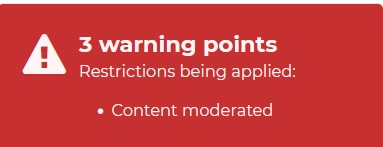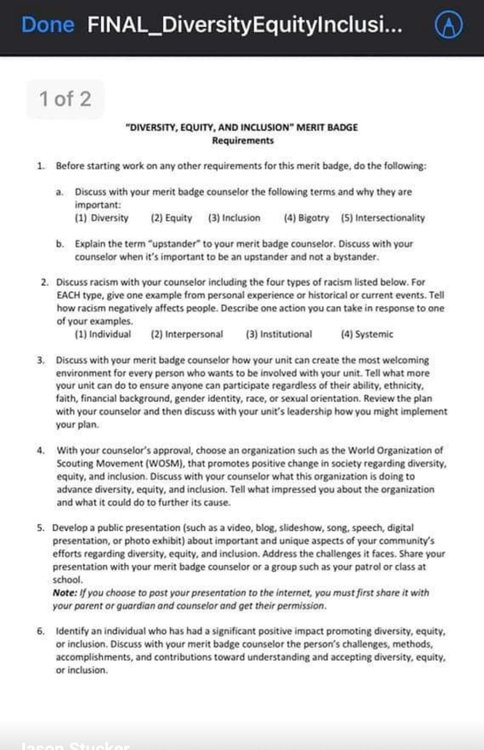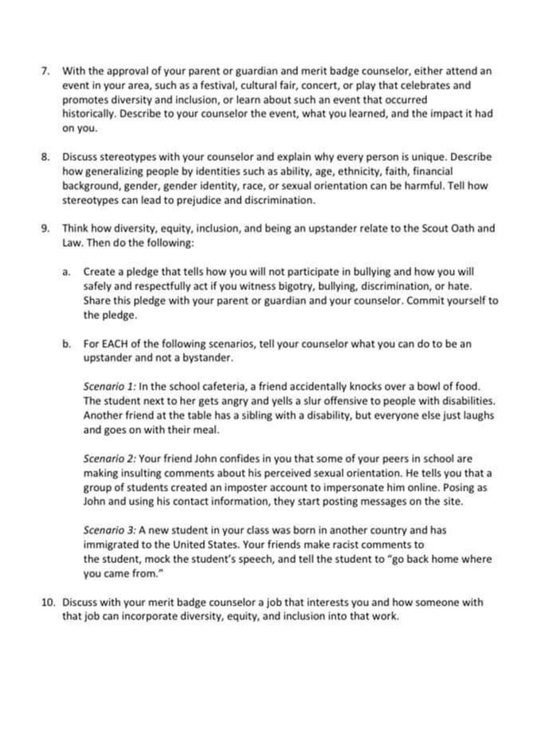-
Posts
3410 -
Joined
-
Last visited
-
Days Won
78
Content Type
Profiles
Forums
Articles
Store
Everything posted by CynicalScouter
-

DRAFT: DE&I merit badge requirements
CynicalScouter replied to CynicalScouter's topic in Advancement Resources
It was conceived in a very polarizing, political time our nation. It was announced amid BSA issuing two (arguably) very political statements from BSA that black lives matter (vs. Black Lives Matter the movement/organization). The mere USE and acknowledgment of these terms ("gender identity"; "equity"; "institutional racism"; "Systemic racism") is to many a political statement that these things exist. There's at least 10-30% of Americans who do not think these things exist at all and, given the lower-case c conservative nature of those who participate in BSA I suspect that number is higher in BSA among leaders and parents. You want to not put this in terms of politics? That's impossible given how permeated the merit badge is with political terms. -

Great Conjunction/ Christmas Star patch
CynicalScouter replied to SWdenleader's topic in Patch Trading Central
There's no indication they will do this. BSA's busy with the new merit badge and the bankruptcy. -

DRAFT: DE&I merit badge requirements
CynicalScouter replied to CynicalScouter's topic in Advancement Resources
I also suspect that the MBCs involved will simply skip those items outright and go with the rest. Although Scenario 2 requires it be discussed -
It is worth noting that while there's been a lot of scouts that went into the military and a lot of scout leaders who came from a military life, there's been something of an ongoing debate over this since Baden-Powell and certainly James West who was at least initially very much trying to avoid a para-military group and others pushing in the other direction who wanted the Boy Scouts as something as a military youth auxiliary. See: https://en.wikipedia.org/wiki/Scouting_controversy_and_conflict#Militarism_in_early_Scouting_movement See also: https://ncte.org/blog/2016/08/role-militarism-bsa-rhetoric/
-

DRAFT: DE&I merit badge requirements
CynicalScouter replied to CynicalScouter's topic in Advancement Resources
I am trying to see how this might work. Would simply defining the terms work? "Sexual orientation": a person's identity in relation to the gender or genders to which they are sexually attracted; the fact of being heterosexual, homosexual, etc. "Gender identity": Gender identity is the personal sense of one's own gender. Gender identity can correlate with a person's assigned sex at birth or can differ from it. And leave it at that? Or is even this so much that we are going to see units defer this to parents? -

DRAFT: DE&I merit badge requirements
CynicalScouter replied to CynicalScouter's topic in Advancement Resources
https://www.facebook.com/groups/2645348722355162/permalink/2892219321001433/?comment_id=2892262530997112&reply_comment_id=2892265320996833 https://www.facebook.com/groups/2645348722355162/permalink/2892219321001433/?comment_id=2892262530997112&reply_comment_id=2892265350996830 -
DIVERSITY, EQUITY, AND INCLUSION MERIT BADGE Requirements 1 Before starting work on any other requirements for this merit badge, do the following: a Discuss with your merit badge counselor the following terms and why they are important (1) Diversity (2) Equity (3) Inclusion (4) Bigotry (5) Intersectionality b. Explain the term "upstander" to your merit badge counselor Discuss with your counselor when it's important to be an upstander and not a bystander 2. Discuss racism with your counselor including the four types of racism listed below For EACH type, give one example from personal experience or historical or current events. Tell how racism negatively affects people. Describe one action you can take in response to one of your examples (1) Individual (2) Interpersonal (3) Institutional (4) Systemic 3. Discuss with your merit badge counselor how your unit can create the most welcoming environment for every person who wants to be involved with your unit. Tell what more your unit can do to ensure anyone can participate regardless of their ability, ethnicity, faith, financial background, gender Identity, race, or sexual orientation. Review the plan with your counselor and then discuss with your unit's leadership how you might implement your plan 4. With your counselor's approval, choose an organization such as the World Organization of Scouting Movement (WOSM), that promotes positive change in society regarding diversity, equity, and inclusion Discuss with your counselor what this organization is doing to advance diversity, equity, and inclusion. Tell what impressed you about the organization and what it could do to further its cause. 5. Develop a public presentation (such as a video, blog, slideshow, song, speech, digital presentation, or photo exhibit) about important and unique aspects of your community's efforts regarding diversity, equity, and inclusion. Address the challenges it faces. Share your presentation with your merit badge counselor or a group such as your patrol or class at school Note: If you choose to post your presentation to the interne. you must first share it with your parent or guardian and counselor and get their permission. 6. Identify an individual who has had a significant positive impact promoting diversity, equity, or inclusion Discuss with your merit badge counselor the person's challenges, methods, accomplishments, and contributions toward understanding and accepting diversity, equity, or inclusion. 7. With the approval of your parent or guardian and merit badge counselor, either attend an event in your area, such as a festival, cultural fair, concert, or play that celebrates and promotes diversity and inclusion, or learn about such an event that occurred historically. Describe to your counselor the event, what you learned, and the impact it had on you. 8. Discuss stereotypes with your counselor and explain why every person is unique. Describe how generalizing people by identities such as ability, age, ethnicity, faith, financial background, gender, gender identity, race, or sexual orientation can be harmful. Tell how stereotypes can lead to prejudice and discrimination. 9. Think how diversity, equity, inclusion, and being an upstander relate to the Scout Oath and Law. Then do the following: a. Create a pledge that tells how you will not participate in bullying and how you will safely and respectfully act if you witness bigotry, bullying, discrimination, or hate. Share this pledge with your parent or guardian and your counselor. Commit yourself to the pledge. b. For EACH of the following scenarios, tell your counselor what you can do to be an upstander and not a bystander. Scenario I: In the school cafeteria, a friend accidentally knocks over a bowl of food. The student next to her gets angry and yells a slur offensive to people with disabilities. Another friend at the table has a sibling with a disability, but everyone else just laughs and goes on with their meal. Scenario 2: Your friend John confides in you that some of your peers in school are making insulting comments about his perceived sexual orientation. He tells you that a group of students created an imposter account to impersonate him online. Posing as John and using his contact information, they start posting messages on the site. Scenario 3: A new student in your class was born in another country and has immigrated to the United States. Your friends make racist comments to the student, mock the student's speech, and tell the student to "go back home where you came from." 10. Discuss with your merit badge counselor a job that interests you and how someone with that job can incorporate diversity, equity, and inclusion into that work.
-

Significant Cultural Changes are Coming Soon
CynicalScouter replied to Cburkhardt's topic in Issues & Politics
If you are trying to recruit young people (and ESPECIALLY their parents) into an organization and you want to "Make Scouting Great Again" by going back to the 1960s (segregated troops/Councils, bans on girls and homosexuals, etc.) go right ahead. And watch the numbers continue to plummet. -

Significant Cultural Changes are Coming Soon
CynicalScouter replied to Cburkhardt's topic in Issues & Politics
Given the image is reality, they won't take their kids in the first place. I know. I've had the conversations personally when people see/know my son was in Cub Scouts. BSA lost the culture wars and it now looked by many as anachronistic and backwards. You can blame it on culture wars or whatever, but the point is there. -

Significant Cultural Changes are Coming Soon
CynicalScouter replied to Cburkhardt's topic in Issues & Politics
Exactly. At this point Boy Scouts is synonymous with intolerance and an anachronistic view of the world. -

Significant Cultural Changes are Coming Soon
CynicalScouter replied to Cburkhardt's topic in Issues & Politics
Yep. Complete with segregated units/Councils and bans on homosexuals and girls. Because nothing says modern than that. -

Significant Cultural Changes are Coming Soon
CynicalScouter replied to Cburkhardt's topic in Issues & Politics
They don't know Dale. What they know that Boy Scouts of America was "intolerant". And now they have kids and won't take their kids to an "intolerant" organization. -

Significant Cultural Changes are Coming Soon
CynicalScouter replied to Cburkhardt's topic in Issues & Politics
It has always been this since the beginning. Connections to churches was a selling point that scouts was about being "moral" and "Duty to God". It didn't "lose" independence. It never had it from the get go. -

Significant Cultural Changes are Coming Soon
CynicalScouter replied to Cburkhardt's topic in Issues & Politics
And what would "getting out of the fight" have looked like, exactly? See my questions here. -

Significant Cultural Changes are Coming Soon
CynicalScouter replied to Cburkhardt's topic in Issues & Politics
How, exactly? I've heard this complaint so often "if only Boy Scouts of America hadn't been so political!" or some such. The Boy Scouts of America has ALWAYS been political. It's embraced a very conservative, rural (if not suburban) view on life circa 1960s Americana. 1) Segregated councils/units: Since early on Boy Scouts of America (national) allowed for segregated units and even outright segregated Councils. National looked the other way and/or simply allowed those "separate but equal" Councils to exist until they self-integrated in the 1970s. That wasn't a "political" position? That wasn't taking a position on "social issues"? Being silent and allowing those segregated councils and units to exist for DECADES, was a message. 2) Homosexuality and adult leaders: In July 1990 James Dale is an Eagle Scout and Assistant Scoutmaster. He attends a LGBTQ learning seminar and is interviewed by the local paper wherein he reveals he is gay. Dale is subsequently removed from his position as an ASM and files suit against BSA in 1992. QUESTION: What was the "nonpolitical" solution that BSA should have taken? Not removed Dale? That's a political position on social issues (being gay is OK). Reinstate Dale once the lawsuit was filed? That's a political position (being gay is NOT OK). This idea that Boy Scouts of America existed or exists in an apolitical, non-social vacuum is not realistic. You want to get a group of young people out for a hike? Fine. But BSA has also been about things like developing a good citizen with good moral values. The MINUTE you start down that road you have to start making political and social/moral judgements (what does it take to be a "good citizen" to have "good morals"?) If you want to strip out all of those elements and turn BSA into a hiking and outdoor explorers club fine. But given Boy Scouts of America's history and infrastructure you'd have to literally tear it apart down it is every core statements ("On my honor, I will do my duty, to God and my country..."), documents, etc. -

Significant Cultural Changes are Coming Soon
CynicalScouter replied to Cburkhardt's topic in Issues & Politics
In my area the answer is Zoom burn out and an inability to do ANYTHING outdoors plus a critical mass loss. That and "wait and see" . 1) Zoom burn out. Scouts, BSA are willing to do things and focus on zoom for 45-60 minutes. The cubs? No way. Plus if they've already been zooming all day long they can't focus. 2) Inability to do anything. COs are banning them from the building in my area. The cubs won't keep the masks on or stay socially distant. And with the change in daylight savings, night comes very early. A few dens tried shifting to Saturday mornings but that's been of only certain help. Meanwhile, my Scouts, BSA troop has had two successful campouts and has done hikes and such. 3) Critical mass loss: once one parent drops it seems to domino ESPECIALLY den leaders. I was at RT last month and a Cubmaster from the largest pack in the district noted this. 8 scout Webelos 1 den. Lead parent dropped and the backup simply never did anything virtual or otherwise and had no desire to do so. 8 families, and not a single one would step up and 4 scouts were likely not going to recharter. This is Baby Sitters of America syndrome: Scouts is there to dump the kids off at once a week for 1.5 hours. 4) "Wait and see". I don't know why, but for Cubs this seems much more likely. We had 2 scouts drop out in our Troop and they just flat out dropped. But at the Pack I've heard much more often "We'll come back next year." We'll see if that's true or not, but I think the Cub drops are much more temporary. Of course the problem is dropping below the 5-scout minimum causes problems for the pack. -

Significant Cultural Changes are Coming Soon
CynicalScouter replied to Cburkhardt's topic in Issues & Politics
Based on my experience I suspect this will not fall evenly among the programs. I think Scouts, BSA and similar (Venture, Sea Scouts) will take minor hits. Cubs are going to get hit hard. -

Significant Cultural Changes are Coming Soon
CynicalScouter replied to Cburkhardt's topic in Issues & Politics
Not necessarily. Offices are a relatively fixed cost. The fact that your membership dropped 25% doesn't mean you remove 25% of your office space the next day. And many councils have had massive layoffs. What do you want, exactly? Everyone works for free? -

Significant Cultural Changes are Coming Soon
CynicalScouter replied to Cburkhardt's topic in Issues & Politics
People DO NOT WANT Council as CO. The problem is that their COs are dropping them and they have a choice: fight to find a new CO (with little to no time) or fold. I can see a situation where MOST of these Council-chartered units are there only temporarily (1 year) until they can get a new CO. -

Significant Cultural Changes are Coming Soon
CynicalScouter replied to Cburkhardt's topic in Issues & Politics
I will say this about all of these "council is evil/kill off the councils" views. I actually sat down with a) a copy of the latest budget and b) a copy of my council's IRS 990 form. I was happy to see that my council is thrifty with its money. I am simply sick at the number of people who simply want to mindlessly hate council (they are HUMAN BEINGS for pity's sake) for that sake alone. -

Significant Cultural Changes are Coming Soon
CynicalScouter replied to Cburkhardt's topic in Issues & Politics
Are you suggesting that councils operate in the same territory? So, this amounts to councils being nothing more than paperwork machines? That a bunch of volunteers will create their own "council" that will be open to anyone, anywhere to just rubber stamp paperwork? -

Significant Cultural Changes are Coming Soon
CynicalScouter replied to Cburkhardt's topic in Issues & Politics
And what precisely do you think the bankruptcy is going to do? Magically make it so councils operate for free? That staff will never have to be paid anymore? The fact is that so long as councils exist, they will need to pay for people. Unless you are one of those who believe that all of Boy Scouts of America should be entirely volunteer led, that means money. -

Significant Cultural Changes are Coming Soon
CynicalScouter replied to Cburkhardt's topic in Issues & Politics
Ok, that's high end of normal, but in range. -
The CO system goes back to 1911. LDS glomed onto Boy Scouts circa 1980s (Varsity Scouting was, in effect, created for the LDS).
-
My understanding is that this was a point of organizational concern but that National when it was created in 1911 was unable to know who in a community was of good character/good leader but that the COs (originally called "Sponsoring Institution" would. In other words, everyone "knew" that local churches were of good moral character and would therefore do the vetting for Scouting to pick good, moral leaders. Same thing with fraternal organizations, etc. This 1934 Boys Life notes . Of course since then the idea collapsed as COs looked at their role as room/hall rental facilities and nothing more. That's why COs that were nothing more than "Parents of Troop 123, LLC" are frowned upon. So the question comes up: who is going to vet and be sure that the unit leaders at least pass the smell test (forget about whether they are good leaders)? You take the COs out of the equation, then all you have left if councils running criminal and credit background checks and hoping for the best. That's where we are now, of course. But that's not what is going to happen GENERALLY. I've seen the new Council-chartered unit agreement. It basically takes the CO responsibility and places it official on Council. At least that way it is officially on someone who may (or may not) take it seriously because right now I know few if any COs who do.









